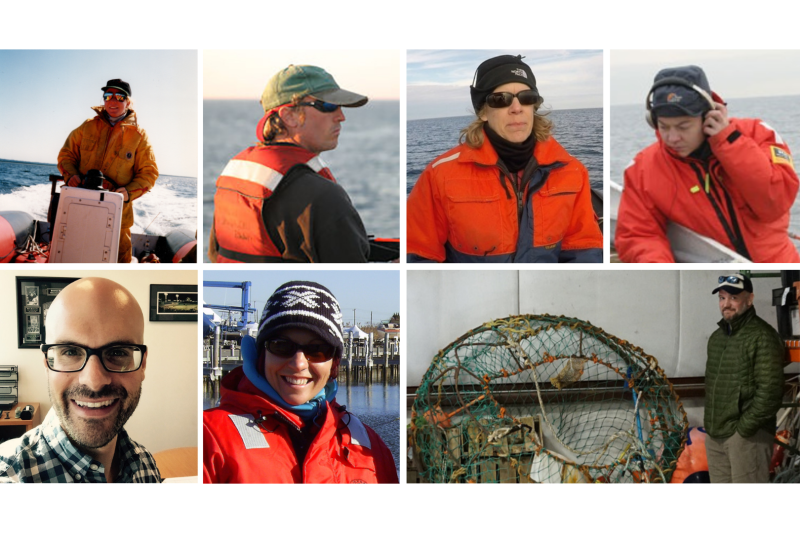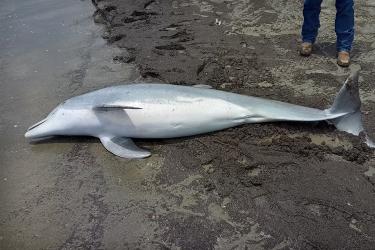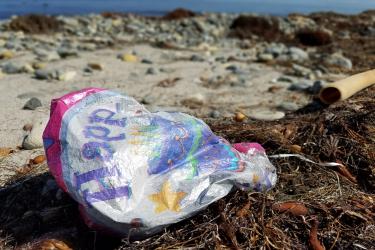Editor's Note December 4, 2023: Endangered North Atlantic right whales are approaching extinction. There are approximately 360 individuals remaining, including fewer than 70 reproductively active females. Human impacts continue to threaten the survival of this species.
Meet the Expert: Diane Borggaard
Diane Borggaard is the Right Whale Recovery Coordinator for NOAA Fisheries Greater Atlantic Region. She works with NOAA Fisheries experts and partners on issues related to the status and conservation of right whales and serves as the coordinator of the North Atlantic Right Whale Recovery Plan Northeast U.S. Implementation Team.
Learn about Diane's current job duties, her educational background, and what inspires her.
Meet the Expert: Tim Cole
Tim Cole works with a team of scientists who conduct surveys from aircraft to monitor North Atlantic right whales in the Northeast, providing valuable clues about their location, behavior, health and body condition, and population status.
The aerial surveys team photographically “captures” as many individual right whales each year as possible in order to monitor the population as a whole. Learn about Tim's role on the aerial survey team and how that research helps us better understand North Atlantic right whale populations.
Meet the Expert: Barb Zoodsma
NOAA organizes and conducts right whale aerial and vessel surveys with our state and nonprofit partners off the coast of Georgia and Florida, which is the key area where right whales give birth.
Learn how NOAA and its partners track right whale mothers and calves to gain more information about this imperiled species in this Q&A with Barb Zoodsma, NOAA Fisheries’ Southeast Region’s North Atlantic Right Whale Recovery Program Coordinator.
Meet the Expert: Sofie Van Parijs
Passive acoustic monitoring is one of the powerful tools NOAA experts use for understanding and monitoring shifts in North Atlantic right whales’ movements. Using technologies like autonomous listening gliders, floating high-tech buoys, or bottom-mounted recorders deployed along the coast, researchers can record whale calls and obtain new insights into range expansion or decline and changing distribution patterns.
Learn more about North Atlantic right whale acoustic monitoring in this Q&A with NOAA zoologist Sofie Van Parijs, who started NOAA’s Northeast passive acoustic research group in 2006.
Meet the Expert: Mike Asaro
Entanglement in fishing lines attached to gillnets and traps on the ocean floor is one of the greatest threats to the endangered North Atlantic right whale.
Mike Asaro, Ph.D., is the Marine Mammal and Sea Turtle Branch Chief of the NOAA Greater Atlantic Regional Fisheries Office. Learn about his work with North Atlantic right whales and how NOAA, in coordination with the Atlantic Large Whale Take Reduction Team, is coming up with innovative technologies and policies to reduce gear entanglements.
Meet the Expert: David Morin
Fishing gear entanglement is one of the leading known causes of North Atlantic right whale deaths in the United States and Canada. Ropes or lines can cut into a whale’s body, cause serious injuries, and result in infections and mortality. Even if a gear entanglement does not ultimately result in death, it can cause severe stress to the whales, making it difficult for the animals to swim and feed, and reducing the likelihood that they will survive to reproduce.
Learn more about right whale disentanglement challenges and tools in this Q&A with NOAA Biologist David Morin, who coordinates disentanglement efforts.
Meet the Expert: Mendy Garron
For Mendy Garron, a “typical” workday doesn’t exist. As the NOAA Fisheries Marine Mammal Stranding and Response Program Coordinator for the northern states in the Greater Atlantic Region, she helps coordinate emergency response efforts for marine mammals, including North Atlantic right whales, that are stranded, in distress, or dead.
Learn more about right whale stranding emergency response and analysis in this Q&A with Mendy.
Meet the Experts: Shannon Bettridge and Peter Kelliher
Learn more about right whale ship strike reduction and response in this Q&A with Marine Mammal and Sea Turtle Conservation Division Chief Shannon Bettridge and Greater Atlantic Regional Marine Mammal Ship Strike and Monitoring Coordinator Peter Kelliher.
Shannon and Peter work with NOAA’s marine mammal survey team and shipping data analysts to review right whale locations and understand where co-occurrence with ships is most prevalent. Knowing where the whales are located from year to year, and even day to day, is especially important when establishing protective management areas.










